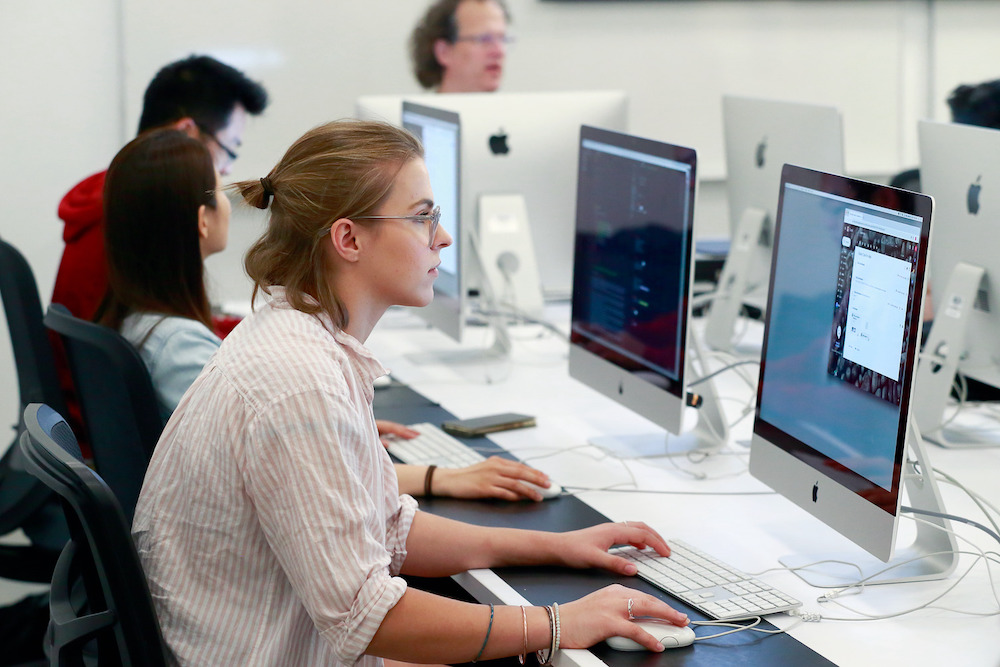Ann Robson has always considered herself an artist. But it was only recently that she’s felt comfortable calling herself a professional one.
After a successful career working as a psychologist and exploring the psychology of creativity, Robson decided she wanted to return to the art practice she’d begun earlier in life and devote herself to art in a more focused manner.
But she knew that she would need some instruction.
“I’m a lifelong learner,” says Robson. “Working in the psych field, I’d become aware of Emily Carr. I knew that the university had a good reputation, and I learned about the continuing studies program somewhere along the way.”
The school drew her in. “The program had a very diverse set of offerings, at a recognized art school, and you could proceed pretty much at your own pace,” says Robson.
In 2013, she began what would become a several-years-long educational journey at the university’s continuing studies department. She started off with classes in painting and drawing, and eventually built up to a full certificate in fine arts. Realizing that she’d already completed many of the required courses for some of the other certificate programs, she decided to carry on, and today holds additional certificates in both painting and drawing.
“For me, as I progressed through the programs, I especially appreciated the encouragement from instructors,” says Robson. “Encouragement to shift your view of yourself and your work — towards thinking of yourself as a serious artist.”
Emily Carr University of Art + Design’s continuing studies department isn’t just for people looking to become professional artists. The university offers a wide selection of courses and certificates, both part time and full time, across an array of disciplines that includes the visual arts as well as industrial, web and UX — user experience — design. They also offer a teen program, for people under 18.
“Our students are extremely diverse,” says credential programs manager Kristina Fiedrich. “We see students who are coming out of high school and aren’t ready yet to commit to a full four-year degree program. They’re not sure where they want to end up or what their career path is, but they know that they’re interested in creative practices.”
She says ECU also sees adults who are working full time, with busy schedules. The flexibility of the programs’ self-directed pace and evening and weekend offerings makes it easy to slot into their weekly routine.
“They might be working in an industry or an area that has nothing to do with creative practices,” says Fiedrich. “They’re finding that they need an outlet, a way to be creative in their lives. So they come to us to take a painting or drawing course, or something that they’ve always been interested in but have never felt confident enough to start.”
She notes that community is a huge draw for many students as well, especially the significant cohort of retirees that the continuing studies department attracts. “They see this as an opportunity to do something they never did when they were younger. They want to join something that feels welcoming and accessible.”
Two of the department’s most popular certificate programs aren’t necessarily offerings one might associate with a fine arts school. Emily Carr University of Art + Design’s continuing studies includes a communication design certificate that covers fields of study like colour theory and typography, but also information visualization and web design. And their most sought-after program is their full-time certificate in UX design, a rapidly growing industry across the world.
“We’re finding that a lot of professionals, especially because of COVID, are needing to pivot or to add on to their skillset with these business-related skills that are also bringing the design side in,” says Fiedrich. “That may include something like web design — how do you pivot your previously in-person business to something that is accessible to people virtually?”
She says that the UX design program sees a wide range of students applying. It is one of only two full-time certificates that ECU offers, and though the program is competitive-entry, Fiedrich says prospective students do not need any previous experience in UX design to apply. ECU has also prioritized financial accessibility by making the program eligible for student loans.
“What’s interesting about UX is that you can come from a number of different backgrounds. When you pair your previous experience or education with UX skills, you can really carve out a very interesting career path for yourself,” says Fiedrich. “So instead of it being about abandoning who you were before and having to start from scratch, it’s more about taking what you’ve done in the past and your skills and building on that knowledge with UX design.”
She says the program attracts many people who have previously worked in marketing, business administration, computer science or even psychology, like Robson. “They’re coming to the UX program because they want a different way of applying those skills.”
Peter Ip was one of those people. Several years ago, while he was working as a digital marketing lead for a Montreal startup, he attended a conference on human-computer interaction and became intrigued by the possibilities of UX design.
Shortly after, he decided to find a short-term intensive program to help him switch career paths and build the knowledge and skills needed to become a UX designer.
“I knew I didn’t want to do a master’s or a long-duration diploma,” says Ip. “Ultimately the timing and duration of the program at ECU, along with [the university’s] reputation, made the choice easy.”
Ip says he was also drawn to the content of the program, and the fact that the certificate covered not only UX design but also basic computer programming skills — something he hoped to draw on to broaden his future work opportunities.
“The classes were around 10 students each, and this set the stage for great class discussions and opportunities to learn from each other,” says Ip. “The instructors had industry knowledge and were flexible in teaching what we wanted to learn, not just off a random curriculum. It felt tailored in some ways.”
Ip now works as a product designer for Shopify, the Canadian e-commerce company. Since the company offers a remote work structure, Ip has been able to live around the world. Currently based in Austria, he plans to travel across Europe over the coming year.
When asked what most surprised him about the Emily Carr University of Art + Design program, Ip says that he was positively surprised by how much the fine arts aspect of his UX courses has proved useful.
“It has helped with my career,” he says. “I am so grateful that it was included in the program.”
Fiedrich notes that continuing studies students are often surprised by just how applicable their arts education can be, and by how inclusive the courses are.
“Everybody is creative,” she says. “You don’t have to be good at drawing or good at anything in particular in order to come and take our courses. It’s not about perfection, and it’s not even about becoming a professional artist. It’s about how these skills can open up something in your life, whether it’s connections to other people, or a connection to yourself that you didn’t realize was lacking.”
Ultimately, she believes, art education has something to offer everyone.
“Students who pursue the creative arts on any level are so well-equipped to communicate complex ideas, to empathize, to give and receive constructive feedback, to maybe be a little more open to other people’s ideas, and to be challenged by other people’s ideas,” says Fiedrich. “Art and design students are uniquely placed to be the world’s creative problem solvers.”
Spring registration for Emily Carr continuing studies programs opens Monday, Oct. 18. Programs are offered variously online and in-person and are open to students from around the world. Prospective students can book a free online session with a program advisor here. ![]()
This article is part of a Tyee Presents initiative. Tyee Presents is the special sponsored content section within The Tyee where we highlight contests, events and other initiatives that are either put on by us or by our select partners. The Tyee does not and cannot vouch for or endorse products advertised on The Tyee. We choose our partners carefully and consciously, to fit with The Tyee’s reputation as B.C.’s Home for News, Culture and Solutions. Learn more about Tyee Presents here.

















Tyee Commenting Guidelines
Comments that violate guidelines risk being deleted, and violations may result in a temporary or permanent user ban. Maintain the spirit of good conversation to stay in the discussion.
*Please note The Tyee is not a forum for spreading misinformation about COVID-19, denying its existence or minimizing its risk to public health.
Do:
Do not: